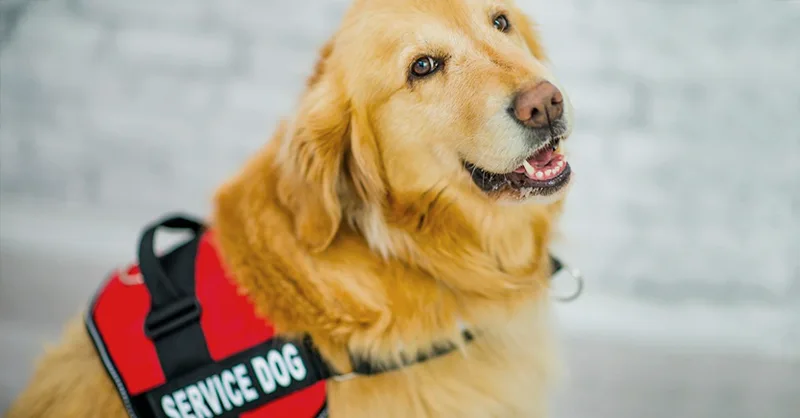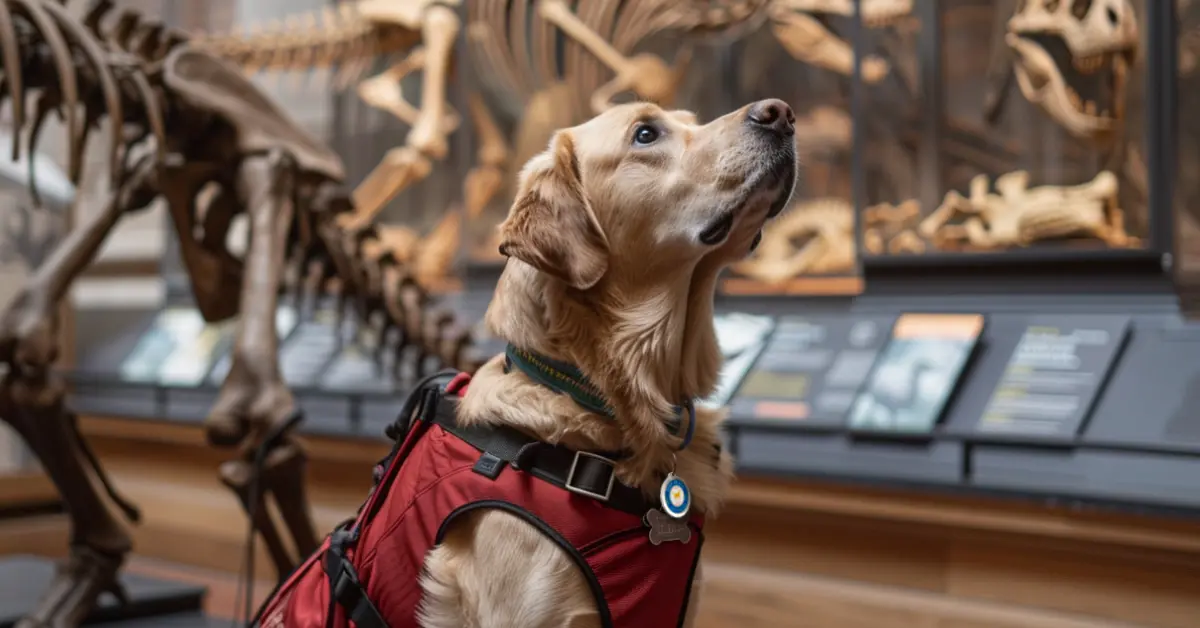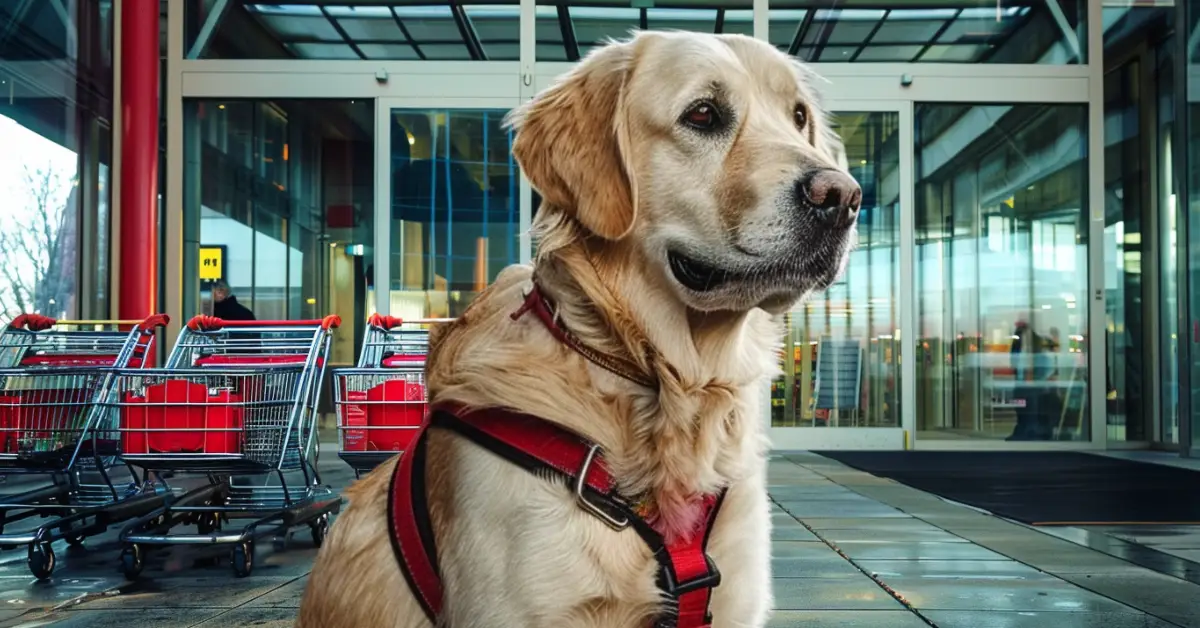Service Dog Certification Guide

If your landlord or an employee at a store asks if your service dog is certified, what exactly does that mean? What precisely do you need to prove you own an actual service dog?
In this guide, we’ll explore 5 things to consider about getting a certified service dog so you can confidently answer if someone asks about your service dog.
#1 – Do you qualify for a service dog?

Service dogs can be incredible companions and helpers for individuals with various disabilities. Here’s a quick rundown of the qualifying criteria for a service dog:
- Having a disability: To be eligible for a service dog, a person must have a physical, sensory, psychiatric, intellectual, or other mental disability that significantly impacts one or more major life activities.
- Requiring assistance related to the disability: The individual needs to benefit from tasks specific to their disability that a service dog could perform.
How do you know if you have a qualifying disability? Under the Americans with Disabilities Act (commonly known as the “ADA”), your condition must be severe enough that it substantially limits a major life activity. If you have a mental health issue and are unsure if you qualify, a PSD letter from your therapist or doctor can be useful.
#2 – Training your service dog to aid in your disability

Professional training organizations: Before you can correctly call your dog a service dog, it must be fully trained to perform a task directly related to your condition. Some organizations offer fully trained service dogs for adoption, but that’s not a realistic option for many people since the cost can run from $20,000 to $60,000.
Alone or with the help of a professional: You’re allowed under the ADA to train a service dog yourself (either on your own or with the help of a professional trainer). Utilizing the services of a good trainer is highly recommended if you lack experience in dog training or if it is difficult for you to do so alone because of your disability.
Service dog tasks for individuals with physical disabilities:
- Mobility assistance: helping individuals stand up, sit down, navigate stairs and uneven terrain; pulling wheelchairs
- Fetching and carrying items: retrieving objects for handlers, carrying items in specially designed backpacks or pouches
- Opening and closing doors: operating door handles, pushing buttons, tugging on ropes to open and close doors
- Alerting to sounds: alerting their handlers with hearing impairments to essential sounds, such as doorbells, smoke alarms, or approaching vehicles
- Obstacle avoidance: helping handlers avoid obstacles in their path, such as furniture, poles, and curbs; steering handlers through crowds
- Intelligent disobedience: refusing a command if it puts their handler in danger
- Emergency assistance: seeking help by finding and alerting others or, if necessary, operating specialized devices, such as emergency call buttons
Service dogs perform a wide range of tasks for the physically disabled. But what about those with psychiatric conditions? Psychiatric service dogs are also called upon to perform an incredible variety of jobs:
- Anxiety and panic attack response: recognizing early signs of anxiety or panic attacks; responding by providing physical comfort, such as nuzzling, leaning against their handler, or placing their head on the person’s lap
- Interrupting harmful behaviors: gently interrupting self-harming behaviors or compulsive actions by nudging or pawing at their handler
- Medication reminders: recognizing the right time and alerting handlers to take medication on schedule
- Nightmare interruption: recognizing signs of distress and waking handlers, especially those with PTSD
- Assistance during dissociation: helping regain focus and awareness by providing tactile stimulation or guiding to a safe space
- Crisis intervention: seeking help when the handler is in severe emotional distress
A bonus for any service dog is their emotional support and companionship. The bond between a handler and their service dog can positively impact the individual’s overall well-being, providing a constant source of comfort and stability.
#3 – Good citizenship and public access training

Public access rights: The ADA gives service dog handlers the privilege of accessing public spaces where animals are typically not permitted. It is the handler’s responsibility to ensure that their service dog remains under their diligent supervision and exhibits exemplary behavior in public settings.
Public access readiness: Before venturing into public environments, it is essential for service dogs to successfully complete a public access test, proving their ability to stay attentive to their handler’s needs and refrain from causing any disturbances in various public surroundings.
Limits to public access: Having a well-behaved service dog that is under your control at all times is essential. If a service dog is acting unruly, aggressive, lunging, barking excessively, or otherwise acting in a dangerous, disruptive, or unsafe manner, it can be asked to leave the premises.
The handler should ensure their service dog can perform its duties in all types of situations, including public environments with many distractions and people.
#4 – Certifying your service dog

Once you have fully trained a service dog for your disability, you can obtain a certificate to recognize your accomplishment. Note that certificates and registrations are not mandated by the ADA, and they are not shortcuts for following proper qualification procedures.
Obtaining certification for your service dog can be useful for several reasons:
- Recognition of training: Certification serves as tangible proof that the service dog has undergone rigorous training to meet specific criteria and standards, ensuring their ability to assist their handler effectively and safely in various situations.
- Public awareness and acceptance: A certified service dog can be more likely to be welcomed and respected in public spaces. The certification demonstrates to others that the dog is trained to behave appropriately and unobtrusively, thus alleviating concerns or misunderstandings. While no one can insist on seeing a certificate as a condition of entry, service dog handlers know that people frequently do this regardless.
- Reduced skepticism and questioning: A service dog with documentation can encounter fewer challenges or inquiries from business owners or the public.
- Enhanced handler confidence: Knowing that their service dog is certified can boost a handler’s confidence in knowing they have done everything the right way to achieve service dog status.
Items like ID cards, vests, and tags fall under the same boat as certifications. They are not necessary but are helpful for service dog owners who want physical tools to signal that their dog is special.
#5 – Verifying your service dog
What should you do if you’re out in public and someone asks if you have a service dog?
Under the ADA, third parties can ask two questions to verbally confirm you have a genuine service dog. Note that if your disability is obviously apparent (for example, if you are in a wheelchair), third parties cannot badger you with these questions.
The two questions that can be asked are:
- Is your dog a service dog required for a disability?
- What work or task has your dog been trained to perform?
Service dog owners have a right to privacy. That means that third parties cannot pester you about the specifics of your health condition or ask that you have your dog perform its task on the spot. These rules are designed to protect the integrity of service dog ownership and preserve the dignity and confidentiality of service dog handlers.
Keep in mind as well that if you are flying with a service dog, the airlines will require certain documents. Take a look at this guide for helpful instructions on how to fly with a service dog.
About the Author: The writing team at Service Dog Certifications is made up of folks who really know their stuff when it comes to disability laws and assistance animals. Many of our writers and editors have service dogs themselves and share insights from their own experiences. All of us have a passion for disability rights and animals.
50 comments
Leave a Reply Cancel reply
Latest Posts

Can you bring a service dog to a museum?
Yes, you can bring your service dog to the museum! All the major U.S. museums welcome guests with service animals in accordance with the Americans with Disabilities Act (ADA). There are some areas, however, that might be off-limits. Here’s what you should know if you plan to spend a day at the museum with your […]

Read More

How to Bring a Service Dog to Six Flags Magic Mountain
Service dogs are welcome at Six Flags Magic Mountain so long as they are, according to Six Flags, “trained to do work or perform tasks for people with disabilities.” Of course, your dog must be housebroken and remain on a leash or harness and under your control while at the park — and the park […]

Read More

When Stores Can Refuse Your Service Dog
According to the Americans with Disabilities Act (ADA), service dogs should be allowed into any store most of the time. A store owner can legally exclude a service dog if they are actively growling, snapping at, or frightening customers, or if the dog is obviously out of the control of its owner. Ordinary behaviors — […]

Read More

My dog alerts me that I am going to have a seizure. How do I get him certified?
I am curious about the same thing. I have VNS and have had great success. However the last 2 days I’ve noticed my dog, a 2yr old Boston terrier, NEVER being more than 2 feet away from me. Seriously wouldn’t even go down the steps to pee… well last night I had 2 seizures. Maverick yelped (Apparently before I fell) to get my husbands attention, my husband said when he got in the kitchen Maverick was right next to me looking like he was “guarding” me. He whined/whimpered the whole time u til the 2nd one. He was laying next to me and was still there when I opened my eyes this morning. I’ve always known he sensed these damn things, and I knew something was wrong with him…. he was telling me to be careful. As pet owners we know our pets better than anyone else, they know us best too. Good luck with your endeavors with your pup, and best wishes with your seizures.
I have a vns also i have a. 2 month old bully pit
He knows whn having anxiety attacks. Panic he can tell everything and they gave me a letter for a emotional support animal I don’t know where to get him registered or get a card at and another doctor gave me a service animal letter I don’t know where to go get him done at on for that either. Andrea Morris
My husband have Parkinson’s diseases and I have my dog, she support him as much she can. I wanted her to be certification how can I go for that?
Please assist thank you
In order to have a legitimate service dog, your dog would need to be specifically trained to support your husband by performing a task. She would need to be at your husband’s side and perform tasks that help him in times of need. You may find this article on Service Dog requirements interesting https://www.servicedogcertifications.org/registration-requirements-service-dog-certification/
I had a toy poodle my epilepsy is from a TBI he knew they were coming on before I did. Got it under control for 12 years then one day he wouldn’t leave me alone keep barking at me getting on and off my lap next thing I know I’m getting loaded into a ambulance, 4 days later I had to put him down. He waited until I was out of the hospital give me loving started to have a seizure and never recovered. Now three years later I am having to fight to adopt a animal that I can train and bond with for my service animal because my seizures are not under control any more. And I do not get it I want this dog can give it everything it needs but because I live in a small one bedroom apartment witch is changing they will not let me have her.
I am a diabetic and have Afib. I also have a stint and Cardo Vagil Vagil at which I can pass out any time. I need to what type dog I would need.
My dog tells me when my blood sugars are liw
My dog wakes me and alerts me when my heart rate drops below 50…I could never figure out why she woke me some nights until I got the Apple Watch! Now I know…every night she wakes me, my heart rate has dropped! It’s truly amazing how much they can protect us!
I have a boxer-Husky mix. I had sence he was a puppy, I was a Truck driver so we was very close so he pick up on my Diabetes AND he knows when I need to go to the hospital I would like to get him certified thank you
I have a lab husky mix and I’m needing to get a sample service dog letter so I can get the doctor to write the letter so I don’t have to loose my dog
Dogs are great. I have one he’s the love of my life
Kane is his name. What a joy he is the love is out of this world.
If my service dog is in training is she still allowed into the same public places as a service animal that is already trained?
In some states no. You may have to look up The states that do allow the same rights to both.
I have a disability called Autism. Which causes me to suffer from anxiety and forget to pay attention or beware and can make going in public uncomfortable. I am planning once I find the right rescue dog that fits the right qualifications to train it myself to know the signs when I am get anxious or when I am about do what dad calls charging, I sometimes do it almost in to traffic. Do you know any good training books I can use and good training methods? I am getting the dog next year and I am rescuing a young one. So if you have any advice I would love it.
Depending on what state you live in
I would very much love to register my dog as a service dog. She has been to obedience classes and is a registered Therapy Dog. However I have sleep apnea and she played a large part in me recognizing this. She would often tug the blankets on my bed and wake me up. Alarmed by my breathing. After my diagnosis and I began using the resmedair, she no longer tugged at blankets. She also helps me with anxiety issues and helps me when she is close with stress. My anxiety builds when I am forced to leave her. She is a gentle dog who does not have a mean bone in her body. Any help and instructions you can give me would be so appreciated. I am sure that my doctors would provide a signed order confirming the facts I have stated.
I took my service dog to darian lake I had her tag on me and everything the security guard kicked me out with my dog he said it didn’t matter dogs aren’t allowed in the park he was very rude to me and escorted me out I was devastated and humiliated with people all around so I took her back home then went back to darian lake and before I left I talked to a luetenet and he informed me all service dogs are welcome there
Call or write the ADA and they will be fined up to $10,000
Do we have to register and how do we? When should we register like if already in classes or not yet or what? I suffer with extreme social anxiety and deppression so it makes it hard for me to live my daily life and Im getting tired of it so I want to try out a service dog since nothing seems to work
A dog becomes a service dog once their training is complete and they are able to fully focus on you and the tasks needed. A dog in training is technically not a service dog yet. Registrations are not required, however, some service dog owners find it easier to communicate the purpose of their service dog having a registration and ID. You may find this article on registration requirements of service dogs interesting https://www.servicedogcertifications.org/registration-requirements-service-dog-certification/
I have a niece that’s a diabetic and wears an insulin pump. We have been trying to find someone help us train her dog. Please if you know of anyone that can help us at a reasonable price let me know.
Any directions in who to talk to to get my dog certified as a service dog and maybe a company that would allow my dog to be a service dog rep for the for example maybe the dogs that lift spirits for the sick children in the hospitals or maybe wounded warriors.
Committed Canine in Brownstown, IL
Trainers Robert and Tammie Rogers
I would like more information on how to get my dog certified
I am disabled and just got a pitbull puppy and am wanting to get him trained to be my service dog but I don’t know where to start.Can you please help me to get started?
I have PTSD as well as anxiety and depression and have been considering training my golden to help me when needed. Where would I be able to get her trained. I live just north of Pittsburgh PA
Where can I have my dog trained to smell cancer? I have read this training is possible. Would this training also qualify for the service dog Certification?
I have, possibly, an odd problem. I have a properly certified dog well into her training and have had no problems with her being accepted any public place or business where I live. However, because anyone (and their mother is seems) may buy a vest with, or without, “Service” on it and portray an ill-mannered animal as a Service Animal, we have now been accosted by other “Service Animals” three (3) times in two months, twice at the same Wal-Mart. Wal-Mart claims they may not ask for certification, that if a dog has a vest on, and the person with it states it is a “Service Animal” they have to allow it in the store.
When I got Sadie certified, I promised to properly train her (she is one criteria from completing the Service Dog training) and carry her proper credentials on her vest, and on my person at all times when she is working. It seems I am the only one held to these rules. I do not understand why I have to be prepared to prove her worth, but other animal owners (with no intention of properly training, or certifying, their animals) do not.
I always notify a business of my intent to bring her with me, and only one has ever objected. This is because of the owners asthma and I respectfully do not take Sadie in there. I will not be able to see very well much longer, and it breaks my heart that Sadie keeps getting accosted by these so-called “Service Animals” that do not have to be trained, and whose owner’s could not control them if their lives depended on it. It is just sad.
He had no right to do that it’s against the law. My cousin know’s because he is a police officer!
I have serve anxiety issues an depression what dog would be best for me for a service dog
I know it can cost thousands of dollars to train a service dog and not all people that need a dog can afford that Can you train your own service dog and then get it tested if that’s even something you have to do to get one registered or dose it need to be trained by a professional trainer
Depending your disability will depend on whether you should train your service dog or let a professional do so. You can register your service dog yourself however there should be some training such as personal/professional obedience training before doing so which is required for all services animals. Now I have a 2 year old chihuahua mix that is a registered as a psychiatric disability service dog I trained myself since she was a few months old and registered her when she turned a year old when she proved to me and others around me that she was able to recognize and preform the duties necessary to de-escalate. I trained her myself due to I was diagnosed with clinical depression, and was emitted to a psychiatric facility a few times after attempting suicide on numerous occasions that hasn’t gone away after my brother was KIA and on occasion a unrecognized trigger will set it off. So she needed to be trained to my personal disability and learn to recognize triggers special to my situation. Now she is able to read body language, hidden emotions, and expressions. She now keeps me from sitting or laying down by myself for long periods of times to prevent certain triggers. She will not allow me to shut any doors whether it be a bedroom or bathroom so she can keep an eye on me and or check on me to see if I’m ok or stray to far away from when off a leash unless it is playtime at the park and even then she watches me. She knows what her service harness means no matter the situation if I place that specific harness on her she knows exactly how to act vs. her hiking harness, or no harness at all she knows the different meanings behind those mentioned. With all the personal training starting from a few months old until she was a year old she had developed herself and notified me new and improved methods to add to her training..So yes depending on your situation and disability you can train your own service dog though for ones such as seeing eye dogs and so forth they need to be trained by a professional..
I’m sorry. I know it’s been a year since your comment but my internet searches aren’t working. I am in a situation with some psychiatric conditions and epilepsy. An assistance dog would greatly improve many things in my life and other’s. How did you train your own dog to suit your individual needs? Is there some sort of website, help, book, program or anything?
If I train my dog and register him. I don’t need to get a trainer to help. I have epilepsy so I lol teach him to help me.
How do I get my dog to obey me
Does it matter what kind of certificate you buy for your service dog? I have a service dog for panic attacks but I am not sure if I should be getting a specific service-dog certificate or if this one will suffice? Thanks!
I get anxiety attack when I am alone in house or work. very nervous and fearful. My dog alerts me if anyone is coming and gives me comfort. I feel safer with her around. How do I get a service certification for her.
when you get a response from a professional, i am following. I also want to get my dog to be a service animal for anxiety but all these websites to get her certified people are telling me they are scams.
Certifying a service dog does not qualify it as a service dog. Certification papers are considered optional service dog paraphernalia. Getting a service dog does not require any specific documentation. The keys are having an eligible disability and a dog that has been trained to assist with that disability. Please see this article on service dog requirements for more details.
I have a six and a half year Boarder Collie who I have had for five years. He was a rescue and I trained him to be my service dog. I am a retired Marine at 100% disability with PTSD from combat. My dog (Ezra) understands the different tones within my voice and makes sure that I stay come by getting close to me and making me love on him. If I have unwanted dreams, he will snuggle next to me or lay on top of me to wake me and calm me. When we travel he knows how to board and get off the aircraft, at restaurants he knows his place and waits until we are done eating. One thing I have issues with since I have PTSD is individuals being very close to me. If anyone is too close Ezra will become the buffer so that I am comfortable. If I don’t notice them, he being my battle buddy will step up and not let them too close and watch their movement and manners.
I didn’t want to wait several years or pay 20K plus for a service dog, so I did the next best thing. I rescued and trained my own. I have a letter from the VA stating that Ezra is my service dog, but since he was not trained by a company they can only list him as an emotional support dog. Which he is more than that. I trained him to under verbal, hand and leash commands. He is very attentive and smart. My question is, how to I get him certified as my service dog and not emotional support dog? I live outside of Seattle and if there is a location that I could go to have certified that would be great.
Thank you for sharing your story, and thank you for your service. You do not need to “certify” a service dog in order for it to qualify as a service dog. The relevant criteria is 1. Do you have an ADA eligible disability and 2. Has your dog been fully trained to perform a task that directly assists with that disability.
I am a Service Member stationed overseas and about to retire from the service (12 months left). I am currently 80% – 90% disabled. I have a French Bulldog (Bonita) that help me focus on my daily activities and reminds me to take my medications.
She is the “ice breaker” when i start staring at walls. I would like to apply for a serv
One starts with their physician. A prescription from a doctor is required under ADA (Americans with Disabilities Act). Certificate by a government agency or 3rd party organization is not required.
You don’t need a “prescription” or any type of documentation from a doctor in order to own a service dog. You may be thinking of a PSD letter which some owners of psychiatric service dogs obtain. These letters however are not mandated by the ADA. You can read more about PSD letters here: https://www.servicedogcertifications.org/psd-letter/
Do service dogs them
Selves need to recertify amd if so how many years
Service dog certifictions do not expire. You may find this article on how to get your dog to be a registered service dog interesting: https://www.servicedogcertifications.org/how-to-register-service-dog/
I dont have a comment i have a question. I am bi polar have night terrors and sleep apnea. What kind of training would my dog need to be able to be my service dog? She already knows when i am depressed and when i stop breathing at night or when i take a nap she will wake me up and get me to take a breath by licking me. Please what do i need to do to get her registered plus on a fixed income.
I am trying to register my service animal that is fully trained to go on an airplane with me does her registration or certificate come with a D.O.T Service Animal Form
We wrote a guide on the DOT’s Service Animal Form which you can find here: https://www.servicedogcertifications.org/how-to-use-the-dots-service-animal-air-transportation-form-to-board-flights/